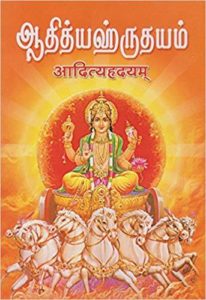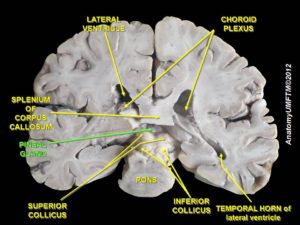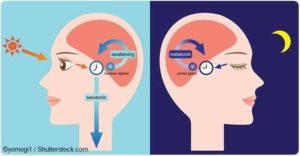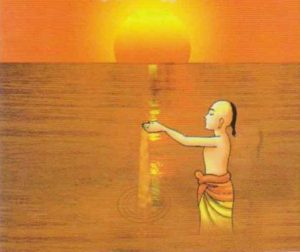Benefits of Chanting Aditya Hrudayam

Aditya Hrudayam brings Positive Energy.
Many Vedic scholars believe chanting Aditya Hrudayam benefits body, soul and most importantly the mind. One of the main reasons to chant Aditya Hrudayam is to get a lot of positive energy early in the morning and be successful in all our endeavors. In fact, Sage Agastya taught this hymn to Lord Rama to boost his confidence and be victorious over his enemy at a time when he was exhausted and fatigued in the battlefield. Is this connection between Sun and mental health a fact or a myth? Let us switchgears to science to see if there is any corroboration.
Seasonal Affective Disorder (SAD)
Last week we saw how Sun travels in his chariot in the sky and drives weather patterns and seasons on earth. Changing seasons affect human health, mental health in particular. Seasonal Affective Disorder (SAD) is a type of mood disorder that is related to change in seasons. SAD symptoms appear in fall, peak in winter, disappear in spring & summer. So there is some scientific truth to the fact that exposure to sunlight boosts mood and metabolism while lack of exposure to sunlight triggers sadness, lethargy and other negative emotions. But what is the link between sunlight and mood? To find the answer we need to dig into the anatomy and physiology of the human brain.
Pineal Gland, the ‘Third Eye’
Residing in the middle of the brain between the two hemispheres, at the same level as the eye, is a small, rice–sized, cone shaped endocrine organ called the Pineal gland. Sometimes it is referred to as the ‘third eye’, a mystical chakra point right in the between the two eyebrows. This gland has special type of cells called pinealocytes. Exposure to sunlight activates the pinealocytes through the photoreceptors present in the retina of our eyes. In response to light stimulation these pinealocytes secrete some chemical substances that regulate mental and behavioral changes that follow a cycle. One of the chemicals is serotonin. Nick-named the ‘happy chemical’ serotonin helps a person to be calm and focused and contributes to happiness and well being. Without enough Sun exposure serotonin levels dip and triggers negative emotions such as anxiety, depression, fatigue, sleep disturbances etc. In fact, in the olden days it was customary to look at the rising sun with one’s eyes wide open for a brief period of time before performing the sun salutations. It is this light transducing ability of pineal gland that contributes to the positive effects of sunlight on mood and mental health of human beings. It is also probably the reason why lighting lamps is so fundamental to Hindu religious practices.


Chant Aditya Hrudayam in Brahma Muhurtham (Dawn)
So, from both scientific and spiritual perspectives it is clear that chanting Aditya Hrudayam is very beneficial to our mind and body. That leads us to the next question – How and when to chant this Shloka?
Aditya Hrudayam is Smriti (texts attributed to an author) and not Sruthi (Vedic literature that are authorless) and there are no set rules for recitation. It is suitable for any devoted aspirant to chant or hear. However, this is a very powerful mantra and out of the reverence to Sun God it is advisable to follow the general rules of Hindu worship. It should be chanted with pure mind and body. Person chanting the Shloka should wake up early in the morning, take bath, wear clean clothes and be very focused and seated in a clean and quiet place for chanting. It is very auspicious to start chanting Aditya Hrudayam from a Sunday. It is ideal to chant it thrice. It can be chanted during any time of the day. But the main purpose is to please Sun God and derive positive energy. Dawn is the time that marks the beginning of a new day, when Sun rises and light is scattered in the atmosphere while Sun is still below horizon. In Vedic language this period (96 minutes in duration) before sunrise is called Brahma muhurtham. If sunrise is at 6 am, then brahma muhurtham falls between 4:30 am to 6 am. This is the time when shift in energy fills space, mind is fresh, and environment is pure and calm. Per Vedic traditions this is the ideal time to perform spiritual practices such as prayers, meditation, yoga etc. Hence waking up in brahma muhurtham and chanting Aditya Hrudayam after finishing the morning rituals is symbolic, supremely blissful and very beneficial. A very interesting fact about this Shloka is that if one starts reciting exactly when the Sun begins to rise above the horizon, at the time of completion the Sun would be completely out and shining. Chanting it during times of distress and danger is also extremely beneficial. Regardless of when we chant, the most important point to remember is to chant the Shloka with utmost devotion and dedication.


